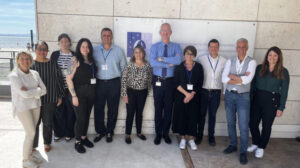The Drugreporter video crew filmed the work of the NGO Juventas (Montenegro) in 2017. The film was used since that in the NGO’s campaign. Watch it and read about the background story! Support, Don’t Punish!
“Sparkle in the Dark – Harm Reduction in Montenegro” is a documentary about the NGO Juventas, which was premiered on the night of the “Support. Don’t punish.” campaign this year.
Filmed in fall 2017, the video itself is a powerful advocacy tool for Montenegro, and even though the length of the video is just 13 minutes, we managed to send a strong message – that Harm reduction in Montenegro works, and that it should be funded.
Juventas as an NGO started its work in 1996, and managed to be at the centre of events related to specific categories of people in Montenegro and their rights. Since 2004, we started our work with PWID and SW, and during the “golden years” of getting the Global Fund to fund our services, we have done really well. Obstacles were there, for sure, everywhere we went, but we managed to somehow work despite them, and we still do.
We showed the desire and effort to keep the program running after the departure of the Global Fund, when we were no longer eligible for funding as Montenegro had become a middle-income country. At that time, we were faced with reality – without funding, we were forced to close almost all existing services within our Drop-in Centres apart from the needle and syringe exchange within the Drop-in centre for persons who inject drugs. Fortunately, after a number of difficult months, our efforts paid off, and all our services started working again. The support of the Global fund matched with domestic funding for the next three years is conditionally provided.
In the documentary, we speak about our daily work, how we run our Drop-in centres and outreach work, what problems we are facing even after all these years of work, and what are the good sides of trying to make a change by doing harm reduction programs. Our clients had the opportunity to explain how services are meeting their needs, especially when related to peer workers’ support. In addition, the documentary also included an overview of our cooperation with governmental institutions, which has proven to be a constant effort aimed at improving the quality of cooperation that our clients will eventually benefit from.
We premiered the movie on June 26th, as a part of our this year’s Support. Don’t Punish campaign. We invited local NGOs, our clients, as well as people from the governmental institutions, in order to draw attention to problems we are all facing. The same night featured a public discussion whose main speakers included members of Montenegrin Harm Reduction Network Link, coordinator of the Harm reduction program for PWID from NGO Juventas Marija Milić, and a psychologist from the Institute of Public Health, Tatijana Đurišić Mandić. The discussion targeted youth and NPS, parents, but also the public in general, who do not possess adequate pieces of information or are willing to hear about potential ways to help their children/family members/community members in need. The discussion was very productive as every person present actively participated, giving the main speakers excellent inputs for future activities especially targeting youth in Montenegro.
The reason behind this kind of a concept can be found primarily in our desire to attract as many people from the general community, for them to hear our stories, to hear what are we fighting with, and to realise that people who use drugs have voices too that need to be heard.
We at NGO Juventas believe that the system of support for young people who are beginning to experiment with psychoactive substances is underdeveloped, and it is of crucial importance that we can adjust the services to their needs, and fight and reduce the stigma surrounding young people who need help and who are talking to us about it.
Most attention should be paid to the following:
• There are almost no prevention programs. Young people are exposed to the illegal drug market and left without an adequate support program.
• Support for persons using drugs is reduced to a few treatment options and is unsatisfactory, especially where children are concerned.
• Coordination of prevention and treatment is almost non-existent, institutions are not linked, programs lack capacity and are often unavailable.
• There is almost no control over the new substances that penetrate our market.
• Prevention of overdose is also on an unsatisfactory to non-existent level.
• There are a few reintegration and resocialisation programs which, in addition, are not sustainable.
So – support, don’t punish and fund harm reduction programs in Montenegro!
Marija Milić, NGO Juventas






